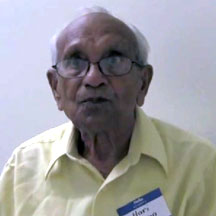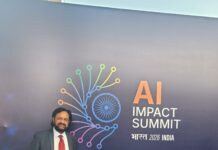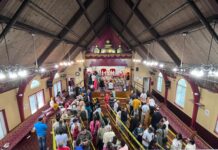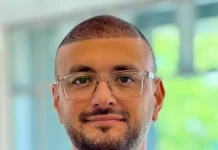
SUNNYVALE, CA: Eminent author and social activist H.N.Verma was recently invited by Cupertino branch of India Community Center to speak on any aspect of spiritualism. He opted for and spoke on “Prayer and Sacraments.” His lecture evoked lively interest among the Senior Citizens present. India Post takes pleasure in reproducing excerpts from his lecture:
Prayer and Sacraments sound like a phoney couple and you may be curious to know why I opted for ‘Prayer and Seven Sacraments’ as the topic for my talk. One of the reasons was that I wanted to speak on a subject of general interest for a friendly audience and keep within the orbit of the organizer’s umbrella program. I thank them for inviting for talking to the members of ICC (India Community Centre.)
Why ‘prayer’? The modern man sees no justification for saying a prayer before the start of a program. The Sun Deity does not respond to Omkar recitation of which is the set program at Hindu functions. As for me I like to join you in ‘Om BhurbhavahSvah’ for I treat it as a good Pranayam (breathing) exercise. My Christian and Muslim friends have different prayers and approaches which we all respect. After all a Christian asks for nothing more than bread, which no person of status would deny to such a submission, at least to keep up his face. And, my Muslim friend has an entire Namaz, preceded by a call in praise of Almighty God, La IlahiIllilah Mohammad RasulillahAllah. But why bring in seven sacraments?
Is that not a fact that some numbers fascinate and catch our attention? We prefer one (1) because there is One God, 3 stands for Trimurti (Hindu concept of deities of creation, preservation, destruction) or (God, His Son and Holy Ghost) for Christians, 4 for Brahma (Chaturmukha) who is my namesake and sounds like Verma, 7 denotes SaptamSvara, Saptapadi, and 13 (symbol for extinction). Go to a hotel, you may not find a room number 13 or a number ending with 13.
It struck me that the sacraments observed by Hindus and Christians are also 7.That is why I opted for Seven (Sacraments). Religions that originated from Hinduism (Jainism, Buddhism, Sikhism) mostly follow Hindu traditions. About Jihad of Islam I have already talked earlier. For the present I will mention only that Muslims share a very painful sacrament known as ‘circumcision’ (aka Khutana) for babies with Jews and some Christians.
Christians observe 7 sacraments as are ordained by their holy scripture, Bible; while Muslims follow the Holy Quran. Hindus rely on Kalpa Sutras under three heads: Shrauta (Vedic), Grahya (domestic), and Dharma (based on religion). These are exposed into Vedangas e.g. grammar (Ashtadhyayi of Panini), astronomy (of Langad), etymology (Nighantu of Yaska), phonetics and meters. In ancient India several Dharmashastras were in vogue but now only four (smritis-traditions) are available.
The modern man, especially one with Scientific bent of mind thinks that religion is out of vogue or at best on the verge of extinction and that spiritualism may be the future way of life. Some even find religion resurfacing and say their claim is spiritual and is not for deriving any political benefits. But what we find is quite different – there is a tussle between Christianity and Islam in the Middle East and much of Africa and parts of Asia for economic dominance. This is intra- religion.
How do we explain inter religion clashes – the Shia-Sunni conflict raging in Iraq, Pakistan and in many Islamic countries? Islam and Christianity both are aggressive and in the past vied with each other to control the world. Christians argue that they left the baggage of superstitions and dogmas way back in 17th -18th century. But truly it is not so! If feudalism was creation of both the faiths – Christianity and Islam, we can safely say that Imperialism and fascism were gifts of both the faiths which caused enormous bloodshed and destruction – revolutions and world wars.
Nevertheless, all faithful continue with their prayers and sacraments and say that science and modernity have reshaped their values and that sheer spiritualism cannot help mankind realize peace in the world. The opponents of Democracy are Al Qaida and ilk like Boko Haram and splinter groups. The heat of their clashes affects the entire world. Death and destruction have no preference. On the other hand Christians pray;
Our father who art in heaven
Hallowed be thy name
Thy kingdom come
Thy will be done on earth as in heaven
Give us our daily bread
Forgive us our debts
As we have forgotten our debts
Lead us not into temptation
Deliver us from heaven. Amen!
Responding to such a prayer, two millennia back, Christ had fed at Apostles’ request a motley crowd of 5000 from a loaf of bread and fish which were distributed a piece each to the hungry crowd. But today such a miracle would be challenged by not only the atheists but by an ordinary person who works hard during the day to share his meager supper with his family.
They say prayer is the last refuge of a weak man. When all avenues are closed to him, he seeks benefit from some supernatural power. The modern man given to rationality thinks that control over the material world can be secured only through science, and not by the prayer of the priest who are agents of manipulation and concoct prayers with magical ideas and egotistical desires. This is superstition. Even so prayer for wish fulfillment remains deep in man’s heart.
Whatever be your religion or pursuit or place of origin, you imbibe a set pattern of life – social norm. Prayer itself is not the cause of conflicts; it is the sense of possession that leads to conflicts. Scriptures – Bible, Quran, Veda and epics are full of such episodes.
Physical needs tally with natural physical development. Men and women in all communities, irrespective of religion they profess, experience physical changes and needs.
Child birth is an occasion of gaiety for the family. As the child grows he experiences a variety of emotions. So does the mother. Relatives gather to participate in customary rites for namkaran – the newly born gets an identity. The child goes to school – this is Patti pooja. He is exposed to Saraswati Vandana.
At a mature age follows yajnopaveet (like baptism of Christians.)This was followed in ancient times by his admission in Gurukul. On return after completing his composite education, he would join family profession\business. He is now stable and with stability comes matrimonial alliance.
The marriage ceremony is colorful. Horse ride, walking seven steps together. Then raising his own family, he is grahastha and goes through the pattern his father had gone through. His social life ends in vanprastha and sanyas. The Myth of Yama is well known and need not be repetition.
Christians too observe sacraments: birth, baptism, matrimony, confession, reconciliation, mass (eucharist). The last supper transforms human energy from God to soul.
Image and icon worship – music, psalm, hymns are part of religion. Homosexuality, same sex marriage, transgender are odd developments. Sex crimes affect the individuals as well as society. Polygamy and polyandry still prevail. In temples, Devadasis used to entertain divinities. Bollywood actors entertain the audiences more lavishly. Living together is the latest fad. This is like warming up for running. Rape cases are occurring in all societies.
Marriage today takes into consideration income, age and compatibility. Late marriage and children born out of wedlock are not rare (Karna was one.) Divorce is no longer rare; wedding is becoming an industry. There is talk of wedding insurance.
Most people have personal experiences. Excessively high rents are affecting social life: male-female students share accommodation and rent, cohabitation leads to both pleasant and unpleasant results.
We may talk a little more about Christian prayer. It may be scriptural – private or public, and spiritual prayer may be liturgy, through divine words, in praise or thanks giving, confessing of sin, and grace. A private prayer may be personal or formal. Prayers are also said\made in the form of petition, intercession, confession, meditation, contemplation and saint poetry.
Often it is asked how is it that the omniscient, omnipresent God, aware of his devotee’s desires, does not secure the devotee’s motive. And, why should not the alignment of individual destiny coalesce with community’s destiny?
At this stage religion poses the concept of resurrection-avatar. The resurrection of Jesus points out that within the span of his earthly existence a man could not realize all the potentialities of his life, he thinks his life is not complete and resurrection is the result. Are you not amazed at this mystery!
Is prayer a short cut to toil and effort? God alone knows. All I can say is that a prayer is a communion between God and the finite agents and there is nothing like a dynamic transforming force.
H.N.Verma retired from India’s Post and Telegrpahs Department as director, commercial publicity. His wife, Amrit Verma, is also an author and they have co-authored some books. They live in Sunnyvale with their son and grandchildren. Apart from study and research the Vermas do community service at the Santa Clara community centre. Verma is engaged in activities of the language bank. If any Indian has difficulty regarding language, he is referred to Verma who helps him in translating his thoughts.
India Post News Service






